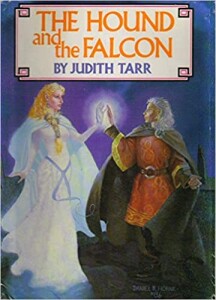 Faith J. Cormier wrote this review.
Faith J. Cormier wrote this review.
Omnibus edition containing The Isle of Glass (1985), The Golden Horn (1985), The Hounds of God (1986)
Do the fey have souls? Are they creatures of God or of the Devil? Can a member of the fey be a devout Christian, and even a Roman Catholic priest?
These are the weighty questions Judith Tarr examines in this trilogy.
Not to give away too much of the story, The Hound and the Falcon follows twenty-odd years in the life of Brother Alfred of St. Ruan’s. When we meet him, he is around seventy but looks seventeen. His body has not aged since he took his vows in the monastery that sheltered him when he was abandoned on its doorstep as a tiny infant. He is a priest and a scholar, a gifted teacher and healer and a weaver of light and shadow (not to mention more prosaic cloth). He is deeply devout, and nowhere do we ever see Alfred stop loving God, even when he is afraid that God has stopped loving him. He is also a changeling, though no one in the story ever seems to understand where changelings come from or why. They just sort of turn up every once in a while.
Eventually Alfred has to leave his monastery. He lives for a time in the court of Richard the Lionhearted. He visits the Holy Land and witnesses the sack of Byzantium. He lives in the fairy kingdom of Rhiyana and visits Rome. He knows joy and despair.
Most of this joy and despair come from the same source – the Church. The more conservative elements of Christianity are convinced that all the fey are soulless Devil spawn and so have commissioned a new monastic order, the Brothers of St. Paul, to exterminate them. Yet other, equally devout, Christians accept the fey as children of God.
Who wins in the end? Well, we get a pretty good idea of what God thinks of it all, and the situation is stabilized, at least in Anglia and Rhiyana, but much as in real life there is no clear-cut victory for anyone.
There’s a little bit of sex and rather more violence (hard to avoid when you talk about the Crusades), but it isn’t graphic or annoyingly inappropriate.
Green Man has reviewed several later books by Judith Tarr: White Mare’s Daughter; Kingdom of the Grail; and the series Devil’s Bargain, House of War and Pride of Kings. I’ve never read any of them, but the reviews indicate that her thinking on religion has changed in the past twenty years or so. Her latest series apparently features several people who are minor characters in The Hound and the Falcon, but the attitude to religion, and specifically to Christianity, has changed.
(Nelson Doubleday, 1993)
